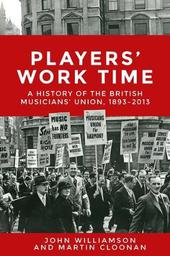
|
Players' Work Time: A History of the British Musicians' Union, 1893-2013
Paperback / softback
Main Details
| Title |
Players' Work Time: A History of the British Musicians' Union, 1893-2013
|
| Authors and Contributors |
By (author) John Williamson
|
|
By (author) Martin Cloonan
|
| Physical Properties |
| Format:Paperback / softback | | Pages:288 | | Dimensions(mm): Height 234,Width 156 |
|
| Category/Genre | British and Irish History |
|---|
| ISBN/Barcode |
9781526113948
|
| Classifications | Dewey:331.881178 |
|---|
| Audience | | Tertiary Education (US: College) | | Professional & Vocational | |
|---|
| Illustrations |
18 black & white illustrations
|
|
Publishing Details |
| Publisher |
Manchester University Press
|
| Imprint |
Manchester University Press
|
| Publication Date |
24 August 2016 |
| Publication Country |
United Kingdom
|
Description
This book examines the working lives of musicians over the past 120 years via the history of the Musicians' Union. The union has been at the centre of all major agreements covering the employment of musicians across the UK's music industries for this period and its role to date has largely been ignored by historians of the music profession, the music industries and trade unions. This book remedies that oversight, providing fresh insight to musicians' working lives, the industries in which they work and wider British social life. It explores a history of confrontation, coercion and compromise played out across the nation's studios, performance spaces and airwaves. -- .
Author Biography
John Williamson is Research Associate in Music at the University of Glasgow Martin Cloonan is Professor of Popular Music Politics at the University of Glasgow -- .
Reviews'Players' work time is a lovingly detailed account of one of Britain's most interesting, enduring and idiosyncratic trade unions. Williamson and Cloonan have made an important contribution to the social history of music.' Simon Frith, Tovey Professor of Music, University of Edinburgh 'In this meticulously researched book, John Williamson and Martin Cloonan provide a long overdue history of the 120 years of the Musicians' Union in Great Britain. By focusing on the unique challenges of unionizing musicians - a group whom too many still do not see as workers - Players' work time is a crucial resource for scholars, activists, policy makers, and musicians interested in the music industries, the labour movement, and the lives and livelihoods of musicians.' Christina Baade, Associate Professor of Communication Studies and Multimedia, McMaster University 'Players' work time does not just tell the history of the Musicians' Union in vivid and fascinating detail; it also documents the dramatic changes that have been experienced by musicians. It reveals too how important the MU has been to shaping the industries in which those musicians work. This book is key reading for anyone who hopes to understand the business of making music.' John Street, Professor of Politics, University of East Anglia 'Their tale is a major contribution to the sociological and political history of British music. Here is the first book to document and analyse the role of the MU in promoting the interests of the nation's professional musicians. It is about musicians as workers, skilled individuals often employed by competing, competitive markets. The book trawls public and private archives to capture a wealth of information about the working conditions of countless musicians whose collective contributions to Britain's cultural life carry major historical significance.' Andrew Stewart, The Musician: Journal of the Musicians' Union Winter 2016 'Oneof the significant achievements of Players' WorkTime is its scope. In this admirable history,its authors demonstrate the complex of influences - social and political, economic and cultural- that govern the employment of those seeking to make their livings as musical workers.' David C.H. Wright , Journal ofPopular Music Studies 'Anyone interested in British musicians and theirenduring union should read this book. It identifies the most significant changesin music industries since the early twentieth century, and helps tocontextualize the problems and challenges facing musicians today.' James P. Kraft, Journal of Popular Music Studies, June 2017 -- .
|